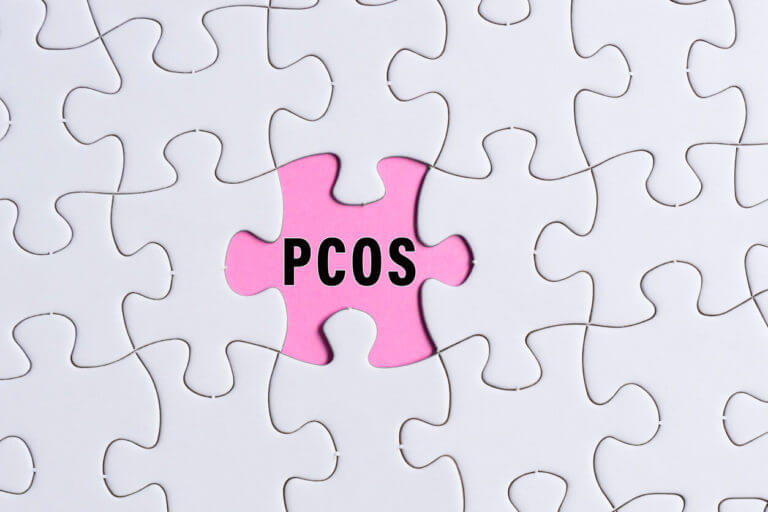
Polycystic ovary syndrome is a very common hormone problem for women, affecting approximately up to 15% of women of reproductive age. Unfortunately, most women with PCOS remain undiagnosed.
PCOS is caused by an imbalance of reproductive hormones, leading to the formation of small cysts in the ovaries.
Let’s explore what PCOS is, its symptoms, and the available management options.
What is Polycystic Ovary Syndrome (PCOS)?
Polycystic ovary syndrome occurs when ovaries (the organs of the body that produce and release eggs) produce unusually high levels of hormones called androgens, causing reproductive hormones to become imbalanced.
As a result of the imbalance in the hormones, people with PCOS often experience symptoms related to the menstrual cycle, such as irregular menstrual cycles, missed periods, or unpredictable evolution.
Despite the name “polycystic”, people with PCOS do not need to have cysts in their ovaries to receive a diagnosis of PCOS. It is pertinent to mention here that ovarian cysts are not painful or dangerous.
PCOS can affect any time after puberty; however, it is more commonly diagnosed in women who are in their 20s or 30s. Obesity and a family history of PCOS significantly increase a woman’s risk of getting PCOS.
Symptoms of PCOS
The symptoms of PCOS can vary greatly from one woman to another, but some of the most common symptoms include:
- Irregular periods: Women with PCOS may experience infrequent periods or very heavy bleeding.
- Weight gain: Many women with PCOS struggle with weight gain, particularly around the midsection. Between 40 and 80% of women with PCOS are obese.
- Abnormal hair growth: PCOS can result in excess hair growth on the face, chest, or back. Approximately 70% of women with PCOS have it.
- Acne: Women with PCOS may experience persistent acne outbreaks, especially on the face, chest, and back.
- Thinning hair: Women with PCOS may start to bald or have loose patches of hair on their heads.
- Infertility: PCOS can make it difficult for women to conceive.
- Darkening of the skin: Dark patches of skin, especially on the folds of the neck, groin, armpits, and under the breasts.
Diagnosis of PCOS
To diagnose PCOS, OB/Gyns usually perform a physical exam and discuss your symptoms, such as irregular or missed periods, acne or excessive hair growth, and polycystic appearance of ovaries. They may also order some tests, including blood work and imaging tests, such as an ultrasound.
They also rule out other conditions that can cause similar symptoms, such as thyroid problems or adrenal gland disorders.
Management of Polycystic Ovary Syndrome
While there’s no cure for PCOS, the symptoms can be managed, and complications can be minimized with certain treatment options.
If you do not plan to become pregnant, your treatment options for PCOS will include:
Hormonal Contraceptives
This involves birth control pills, patches, shots, vaginal rings, or intrauterine devices. Hormonal contraceptives help regulate the menstrual cycle, improve acne, and help with excess hair growth.
Metformin
Metformin is an insulin-sensitizing drug that keeps the level of insulin under control. Once the level of insulin is under control, some people with polycystic ovary syndrome see improvements in their symptoms, such as menstrual cycle irregularities.
Anti-androgens
Your OB/GYN can also recommend some medications to block the effect of androgens. This will help control excess hair growth and acne.
Lifestyle Changes
Lifestyle changes such as maintaining a healthy body weight, eating a nutritious diet, and exercising regularly can also positively affect insulin levels and, ultimately, PCOS symptoms.
If you want to conceive now or in the future, your treatment options for PCOS will include:
Medications to Induce Ovulation
Ovulation is necessary for fertilization and conception. Your OB/GYN can recommend certain drugs, such as clomiphene and letrozole, to induce ovulation in people with PCOS. In some cases, they may also administer gonadotrophins in the form of injections.
Surgery
In several cases, a surgical procedure is recommended to help restore the release of eggs from the ovary. The surgical procedure involves removing tissues in the ovaries that produce androgen hormones.
In Vitro Fertilization
This is a beneficial option for people with PCOS who fail to benefit from medications.
Ob/Gyn Doctor Near Me in West Orange, NJ
PCOS is a chronic condition that affects many women worldwide. It can be challenging to live with, but it’s essential to know that proper management can alleviate the symptoms and reduce long-term complications.
If you suspect you may have PCOS, talk to our doctor here at Hudson MD Group and get the necessary tests. Our exceptional team of OBGYNs understands the complex characteristics of reproductive conditions and provides high-quality treatment and management for a comprehensive range of conditions, including PCOS.
For a thorough evaluation and comprehensive treatment, schedule your consultation with one of our providers by calling us at (973) 705-4914 or using our online appointment request form. We look forward to serving you!


